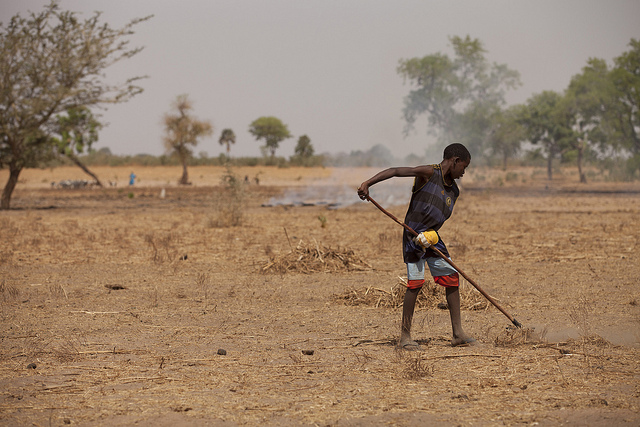As the impacts of our changing climate materialize and intensify, developing countries—and poor people who inhabit them—will be impacted first and to the greatest degree. Land degradation, desertification, and a dwindling global water supply pose substantial threats to livelihoods as well as food and national security.
Today, the United Nations (UN) celebrates its annual World Day to Combat Desertification. This year’s theme, “Land belongs to the future – Let’s climate proof it!” sounds the alarm on the importance of sustainable land management practices within the context of climate change.
One-third of the world’s population currently lives in drylands, and desertification and droughts play a major role in both migration and displacement. According to the UN, 42 percent of the world’s very poor live in degraded areas, which translates to lower agricultural outputs as well as lower incentives for investing in productive technologies. What’s more, as the global population continues to swell, it is estimated that, by 2030, there will be a 50- percent increase in demand for food and a 30- percent increase in demand for water. How can we meet the challenge in the face of dwindling resources?
Ecosystem-based adaptation and sustainable land management offer a path forward. In recent years, IFPRI has carried out significant work on the issue of land degradation—investigating the underlying causes, such as poverty, population density, and government effectiveness, and producing the necessary evidence to guide the creation of effective policies and strategies. Following are a few examples from our recent work:
- “Land Degradation, Poverty, and Marginality”—In 2014, IFPRI Senior Research Fellow Ephraim Nkonya, in collaboration with Nicolas Gerber and Joachim von Braun of the Center for Development Research (ZEF), published a chapter in Marginality: Addressing the Nexus of Poverty, Exclusion and Ecology. The chapter examines the relationship between poverty and land degradation, arguing that the latter must be included in global assessments of well-being.
- “Food Security in a World of Natural Resource Scarcity”—A 2013 report led by IFPRIresearchers examines growing global demands on land, food, and water, as well as which types of agriculture technologies carry the greatest potential to boost crop production in developing countries while sustaining natural resources for future use.
- “Putting a Price Tag on Land Degradation”— Ephraim Nkonya explains his work studying the costs and benefits of various land management techniques in the context of land degradation in a November 2013 article in IFPRI’s Insights magazine.
- The Economics of Land Degradation (ELD) initiative—IFPRI is a partner in the ELDinitiative, which aims to improve awareness of the importance of healthy land. ELD’s goal is to “establish a global approach for analysis of economics of land degradation.”
Related materials







